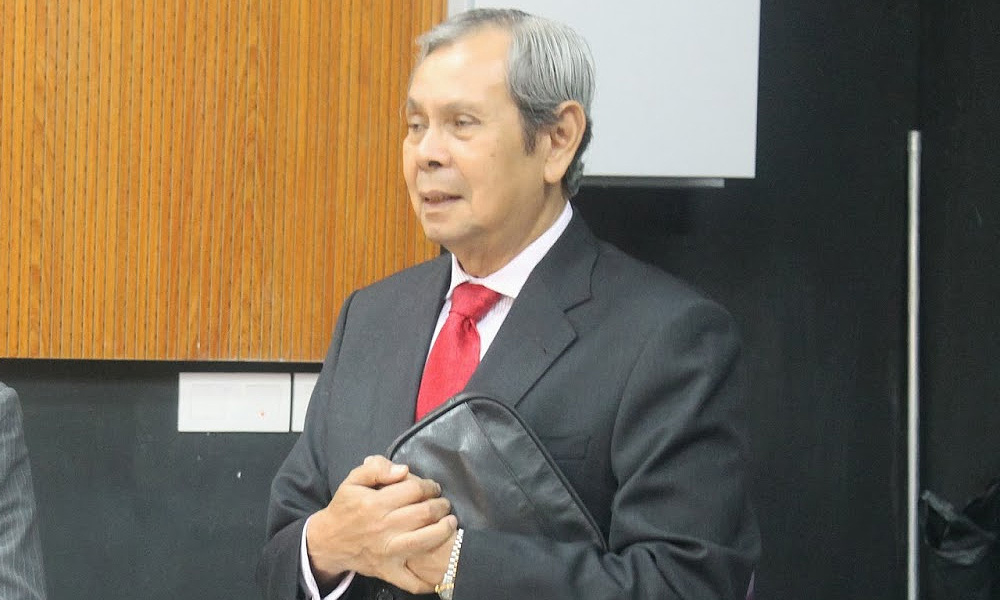COMMENT | Not too long ago, I was one among more than two million pilgrims in Mecca performing the haj. While there I recalled Malcolm X’s “Letter from Mecca”:
“There were tens of thousands of pilgrims, from all over the world. They were of all colours, from blue-eyed blondes to black-skinned Africans. But we were all participating in the same ritual, displaying a spirit of unity and brotherhood…”
- Malcolm X
His experience during the haj greatly changed him. Upon his return, Malcolm X left his radical views on race. Instead, he embraced unity amongst fellow man.
What we have seen on May 9, 2018 is reflected in Malcolm X's observations. Millions of Malaysians, irrespective of race and religion, came together, sharing the same hope for a better country. This important milestone in our history, is a testimony to how a strong will and desire for change can make the impossible possible. Although it may sound cliché, unity in diversity truly reflects the maturity of society - where differences are respected and celebrated as the essence of nation building.
The National Philosophy of Education (NPE), officially formulated in 1988 during the premiership of Dr Mahathir Mohamad and then Minister of Education, Anwar Ibrahim, echoes this spirit of nation building:
“Education in Malaysia is an ongoing effort towards further developing the potential of individuals in a holistic and integrated manner, so as to produce individuals who are intellectually, spiritually, emotionally and physically balanced and harmonious, based on a firm belief in and devotion to God. Such an effort is designed to produce Malaysian citizens who are knowledgeable and competent, who possess high moral standards, and who are responsible and capable of achieving high level of personal well-being as well as being able to contribute to the harmony and betterment of the family, the society and the nation at large.”
- The National Philosophy of Education (NPE), 1996
In order to infuse our education philosophy into the National Education Policy (NEP), the Education Act 1996 (Act 550) among others provides for the establishment of a National Education Advisory Council (NEAC). The NEAC’s function is to give independent advice to the Government on matters related to education.

Consultative engagement
I have always believed in consultative engagement with experts of diverse backgrounds. In fact, more than 1,400 years ago, in a city over 340km from where I was, Prophet Muhammad (peace be upon him) built a strong and united community in Madinah on the basis of shura (consultation). Abu Hurayrah observed, “Never have I seen anyone more prone to seeking his Companions’ counsel than the Messenger of Allah.” [recorded by al-Tirmidhi]. In fact, Allah commends and commands the Prophet:
“By an act of mercy from God, you [Prophet] were gentle in your dealings with them– had you been harsh, or hard-hearted, they would have dispersed and left you– so pardon them and ask forgiveness for them. Consult with them about matters, then, when you have decided on a course of action, put your trust in God: God loves those who put their trust in Him.”
- Ali ‘Imran/3: 159
Al-Raysuni in “Al-Shura: The Quranic Principle of Consultation” argues that the verse above is adssed to the Prophet “in his capacity as guide, educator, commander and leader” which “required him to be gentle, kind, compassionate towards others, tolerant of their failings and forgiving when they sinned”. The verse also advised the Prophet “to seek out others’ counsel and show consideration for others’ opinions”. In view of this foundational principle, our Ministry has appointed seven members, with an additional four members soon to be announced, to serve as members of the NEAC - playing a significant role in uplifting our current education system.

I trust that members of the NEAC, headed by Wan Mohd Zahid Mohd Noordin (photo), the former director general of Education who was also the chairman of this council for 2010-2012, will advise me accordingly. Wan Zahid is recognised as one of Malaysia’s prominent figures in education. His aspirations are clear: to ensure equal access to education, nurture students that are globally competitive and inculcate a culture of love in schools, while ensuring that the whole experience of education is an enjoyable one.
Yong Poh Kon, the deputy chairman of the NEAC, on the other hand is a well-respected corporate figure who has contributed greatly to education. He will help us rethink how our graduates can better match market needs and industrial demands. This is crucial if we are to increase employability and overcome the problem of youth unemployment.
The other five members of the NEAC also represent important stakeholders of the education system.
As the co-founder and chair of Parent Action Group for Education (PAGE), Noor Azimah Abdul Rahim can share parents’ perspectives on education. Moreover, she also chairs the Elena Cooke Education fund that was launched in 2009 to assist needy children to pursue higher education. Satinah Syed Saleh, played a crucial role in formulating the Education Act 1996 (Act 550) and the Private Higher Educational Institutions Act 1996 (Act 555). She was also the head of the project management office (Phase I) which reviewed the Malaysian education system that culminated into the Malaysian Education Blueprint 2013-2025.
Broad views
I have also included Sukiman Sarmani in the NEAC to benefit from his 40 years’ experience as a lecturer and academic administrator who oversaw the development and assessment of the science curriculum in universities. Brigadier general Yusri Anwar, who is currently the commander of the air defence artillery group has also been roped into this council.

One might wonder, why is a military brigadier general also in the NEAC? He was appointed for his insights on how patriotism can be encouraged through education. Love towards one’s country and the willingness to make sacrifices for its betterment is important in nation building.
Ruzita Mohd. Amin, an expert in economic and disability studies, was appointed to ensure that people with special needs have opportunities within the education system. She currently heads the Disability Services Unit at the International Islamic University Malaysia and was a member of the National Council for People with Disabilities. Ruzita is a strong proponent of holistic and inclusive quality education, who wants to see the transformation of special education in the country.
As mentioned, once our laws are amended there will be an additional four members. They will be educationists who represent views from Sabah and Sarawak as well as the Indian community. The composition of the NEAC, reflects my desire to transform the education system. To create a system that has the ability to compete with the rest of the world whilst embodying the values of happiness, love and mutual respect.
I have confidence that the members of the NEAC will without fear or favour, provide me with crucial advice to help me develop a holistic and inclusive education system - that realises the hopes of Malaysians from all walks of life.
MASZLEE MALIK is Education Minister.
The views expressed here are those of the author/contributor and do not necessarily represent the views of Malaysiakini.

